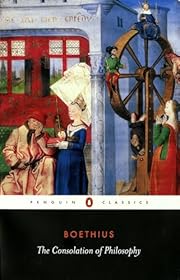

Fai clic su di un'immagine per andare a Google Ricerca Libri.
|
Sto caricando le informazioni... Consolatio Philosophiaedi Boethius

Folio Society (413) » 9 altro Sto caricando le informazioni...
Iscriviti per consentire a LibraryThing di scoprire se ti piacerà questo libro. Attualmente non vi sono conversazioni su questo libro.   ) )This is a new translation of Boethius Consolation of Philosophy. I found the book to be a fascinating approach to philosophy with the author sometimes using a sort of Socratic approach to question his own beliefs and those of the persona of philosophy herself. This relatively short tome provides a breadth of philosophical discussion that belies the size of the book. Written at the end of his life when he was in prison this thoughtfully raises questions about the use of philosophy for life and how one can pursue happiness as a human being. The Phaedo, in which Socrates describes how a philosopher approaches death while imprisoned and awaiting execution, had the most influence on the book. Porphyry and Proclus, two Neoplatonic interpreters, are used to interpret Plato. There also were moments that his approach suggested a touch of stoicism, which is not surprising given the environment in which he wrote this text. The book narrates a discourse between Boethius and a vision of the Lady Philosophy, or philosophy personified in feminine form and resembling Diotima from Plato's Symposium. The work is primarily written in prose and is organized into five main portions, or books. It also includes 39 poems, which are almost like the chorus odes of Greek tragedy. The Lady Philosophy attacks Boethius for reneging on his philosophical principles under stress and contends that if he had been true to his philosophical education, he would not be sad about being imprisoned, going through torture, or waiting to be executed. Instead of expressing sympathy, the Lady Philosophy blames Boethius. His discussion of "what is true happiness'' was one of the high points in my reading. Given that happiness does not represent external occurrences but rather our emotional response to those situations, Lady Philosophy advances the Stoic idea that happiness is within our control. Even if we have no influence over the world around us, we do have control over how we react to it. She also makes the argument that because luck is erratic by nature, one shouldn't rejoice in good fortune or lament poor luck because it is unpredictable and always changing. He also touches on many other issues like the nature of perfection, the problem of evil, and the being of a good God. Overall this is one of the best short works of philosophy that I have read and I will put on my shelf with the Meditations of Marcus Aurelius and other great short philosophical works. We generally imagine the fall of Rome as the beginning of The Dark Ages, with thought going from philosophy and reason to Dark Age superstition…. I feel like reading this book lets you witness this process firsthand. The first half of this book very much follows “classical” thought of stoics/epicureans and feels like a classical philosophy book, attempting to derive some sort of first principles and then applying them to daily life for practical advice on how to reason about the world and our reality. Then, around the halfway mark, it basically becomes “you don’t know God’s plan, nor can you” said in so many ways. It was this general attitude that led to the anti-intellectual period of the Dark Ages… that attempting to even understand what’s going on in the world is an act of arrogance and defiance of God. This book doesn’t go that far, but you can see the seeds of such thought coming in. All that having been said, the first half or so is really nice and the circumstances of the book being written are harrowing and admirable enough to be worth the read if you like the classics.
"'The Consolation of Philosophy', composed in jail, here inspires a former prisoner [in Lebanon] to write a moving preface [to the Folio edition]. Appartiene alle Collane EditorialiÈ contenuto inÈ riassunto inHa come guida di riferimento/manualeHa come commento al testoHa come guida per lo studenteElenchi di rilievo
Composed while its author was imprisoned, this book remains one of Western literature's most eloquent meditations on the transitory nature of earthly belongings, and the superiority of things of the mind. Slavitt's translation captures the energy and passion of the original. And in an introduction intended for the general reader, Seth Lerer places Boethius's life and achievement in context. Non sono state trovate descrizioni di biblioteche |
Discussioni correntiNessunoCopertine popolari
 Google Books — Sto caricando le informazioni... Google Books — Sto caricando le informazioni...GeneriSistema Decimale Melvil (DDC)100Philosophy and Psychology Philosophy General PhilosophyClassificazione LCVotoMedia: (3.91) (3.91)
Sei tu?Diventa un autore di LibraryThing. |
|||||||||||||||||||||||||||||||||||||||||||||||||||||||||||||||||||||||||||||||||||||||||||||||||||||||||||||||||||||||||||||